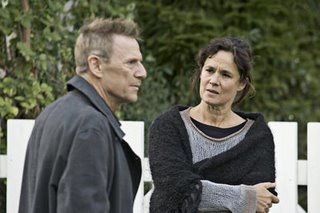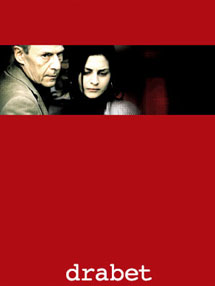Drabet
by Nick
In my review of Storm I wrote about a journalist who claimed the Danes were continuing to beat the Swedish film industry. It's true. Pathetic, of the Swedes, but painfully obvious.
To go somewhat back in history; I don't know how many of you read, or even remember, the last Viking Gangbang column. But anyway, in it I mentioned Per Fly's trilogy on the social classes, at that point comprising of The Bench and The Inheritance, dealing with the under- (some would rather say working-) and upper class, respectively. Like I said then, "these are dark, pitiless films" well worth checking out.
Now with the release of the concluding part of the trilogy, Drabet, Per Fly sets his focus on the middle class. Drabet basically translates into 'The Manslaughter', but something tells me that won't be the English title.
 Carsten (Jesper Christensen), a former radical leftist, is a midddle-aged high school social sciences teacher, married to a Swedish woman (Pernilla August) with whom he has a nice villa and an adult son. And on the side he is having an affair with former student Pil (Beate Bille), a leftist activist with who - it is assumed - he relives his youthful days fighting American imperialism, discussing politics.
Carsten (Jesper Christensen), a former radical leftist, is a midddle-aged high school social sciences teacher, married to a Swedish woman (Pernilla August) with whom he has a nice villa and an adult son. And on the side he is having an affair with former student Pil (Beate Bille), a leftist activist with who - it is assumed - he relives his youthful days fighting American imperialism, discussing politics.
Pil though, it is made clear in the beginning, is not satisfied with simply talking, but believes in action. But something goes very awry, when she and her fellow activists are arrested for the manslaughter of a police officer, after having thrashed the offices of a missile manufacturer. Carsten leaves his family to be with Pil, and from there on things go more and more complex.
Jesper Christensen, magnificent in The Bench, is once again in the lead role, but now plays a very different man, with a very different set of values. It has to be said that the man has one of those exquisitely weathered faces that instantly evoke a sense of pathos.
(I've had professors like Carsten, and always found them to be hypocrites, so there was a certain not-entirely-guilty satisfaction in watching him, bit by bit, abandon his righteous values.)
 The question of whether there even is such a thing as social class is of course a discussion worth having. In the context of Drabet, and Fly's two other films, seeing them out of that perspective gives these already great dramas even greater depth; Drabet becoming a reflection on not only individual but collective self-deception, guilt and lies.
The question of whether there even is such a thing as social class is of course a discussion worth having. In the context of Drabet, and Fly's two other films, seeing them out of that perspective gives these already great dramas even greater depth; Drabet becoming a reflection on not only individual but collective self-deception, guilt and lies.
But now, with the trilogy concluded, what seems to be a main theme and message Per Fly tries to get across is one of self-honesty and responsibility. And he really strikes it home.
If there ever were some contemporary films that deserved the epithet 'Modern Classics', and an immediate treatment for the Criterion Collection, these are it. Together they form a body of work on the level of The Celebration and Lars von Triers trilogy of suffering women. They are simply that great.
To go somewhat back in history; I don't know how many of you read, or even remember, the last Viking Gangbang column. But anyway, in it I mentioned Per Fly's trilogy on the social classes, at that point comprising of The Bench and The Inheritance, dealing with the under- (some would rather say working-) and upper class, respectively. Like I said then, "these are dark, pitiless films" well worth checking out.
Now with the release of the concluding part of the trilogy, Drabet, Per Fly sets his focus on the middle class. Drabet basically translates into 'The Manslaughter', but something tells me that won't be the English title.
 Carsten (Jesper Christensen), a former radical leftist, is a midddle-aged high school social sciences teacher, married to a Swedish woman (Pernilla August) with whom he has a nice villa and an adult son. And on the side he is having an affair with former student Pil (Beate Bille), a leftist activist with who - it is assumed - he relives his youthful days fighting American imperialism, discussing politics.
Carsten (Jesper Christensen), a former radical leftist, is a midddle-aged high school social sciences teacher, married to a Swedish woman (Pernilla August) with whom he has a nice villa and an adult son. And on the side he is having an affair with former student Pil (Beate Bille), a leftist activist with who - it is assumed - he relives his youthful days fighting American imperialism, discussing politics.Pil though, it is made clear in the beginning, is not satisfied with simply talking, but believes in action. But something goes very awry, when she and her fellow activists are arrested for the manslaughter of a police officer, after having thrashed the offices of a missile manufacturer. Carsten leaves his family to be with Pil, and from there on things go more and more complex.
Jesper Christensen, magnificent in The Bench, is once again in the lead role, but now plays a very different man, with a very different set of values. It has to be said that the man has one of those exquisitely weathered faces that instantly evoke a sense of pathos.
(I've had professors like Carsten, and always found them to be hypocrites, so there was a certain not-entirely-guilty satisfaction in watching him, bit by bit, abandon his righteous values.)
 The question of whether there even is such a thing as social class is of course a discussion worth having. In the context of Drabet, and Fly's two other films, seeing them out of that perspective gives these already great dramas even greater depth; Drabet becoming a reflection on not only individual but collective self-deception, guilt and lies.
The question of whether there even is such a thing as social class is of course a discussion worth having. In the context of Drabet, and Fly's two other films, seeing them out of that perspective gives these already great dramas even greater depth; Drabet becoming a reflection on not only individual but collective self-deception, guilt and lies.But now, with the trilogy concluded, what seems to be a main theme and message Per Fly tries to get across is one of self-honesty and responsibility. And he really strikes it home.
If there ever were some contemporary films that deserved the epithet 'Modern Classics', and an immediate treatment for the Criterion Collection, these are it. Together they form a body of work on the level of The Celebration and Lars von Triers trilogy of suffering women. They are simply that great.


0 Comments:
Post a Comment
<< Home